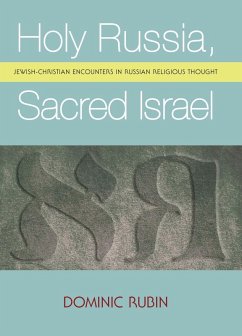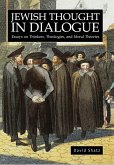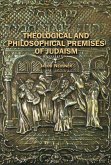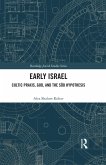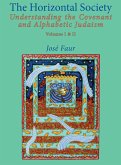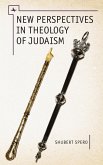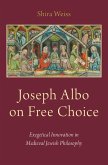Dominic Rubin
Holy Russia, Sacred Israel (eBook, PDF)
Jewish-Christian Encounters in Russian Religious Thought
0,00 €
0,00 €
inkl. MwSt.
Sofort per Download lieferbar

0 °P sammeln
0,00 €
Als Download kaufen

0,00 €
inkl. MwSt.
Sofort per Download lieferbar

0 °P sammeln
Jetzt verschenken
Alle Infos zum eBook verschenken
0,00 €
inkl. MwSt.
Sofort per Download lieferbar
Alle Infos zum eBook verschenken

0 °P sammeln
Dominic Rubin
Holy Russia, Sacred Israel (eBook, PDF)
Jewish-Christian Encounters in Russian Religious Thought
- Format: PDF
- Merkliste
- Auf die Merkliste
- Bewerten Bewerten
- Teilen
- Produkt teilen
- Produkterinnerung
- Produkterinnerung

Bitte loggen Sie sich zunächst in Ihr Kundenkonto ein oder registrieren Sie sich bei
bücher.de, um das eBook-Abo tolino select nutzen zu können.
Hier können Sie sich einloggen
Hier können Sie sich einloggen
Sie sind bereits eingeloggt. Klicken Sie auf 2. tolino select Abo, um fortzufahren.

Bitte loggen Sie sich zunächst in Ihr Kundenkonto ein oder registrieren Sie sich bei bücher.de, um das eBook-Abo tolino select nutzen zu können.
Dominic Rubin (Ph.D. in Linguistics, London University) is a lecturer in Philosophy, Biblical Hebrew, Old Testament at St.Philaret's Orthodox Christian Institute and the Moscow Higher School of Economics.
- Geräte: PC
- ohne Kopierschutz
- eBook Hilfe
- Größe: 2.43MB
- FamilySharing(5)
Andere Kunden interessierten sich auch für
![Jewish Thought in Dialogue (eBook, PDF) Jewish Thought in Dialogue (eBook, PDF)]() David ShatzJewish Thought in Dialogue (eBook, PDF)130,95 €
David ShatzJewish Thought in Dialogue (eBook, PDF)130,95 €![Theological and Philosophical Premises of Judaism (eBook, PDF) Theological and Philosophical Premises of Judaism (eBook, PDF)]() Jacob NeusnerTheological and Philosophical Premises of Judaism (eBook, PDF)130,95 €
Jacob NeusnerTheological and Philosophical Premises of Judaism (eBook, PDF)130,95 €![Jewish Religion After Theology (eBook, PDF) Jewish Religion After Theology (eBook, PDF)]() Avi SagiJewish Religion After Theology (eBook, PDF)0,00 €
Avi SagiJewish Religion After Theology (eBook, PDF)0,00 €![Early Israel (eBook, PDF) Early Israel (eBook, PDF)]() Alex Shalom KohavEarly Israel (eBook, PDF)41,95 €
Alex Shalom KohavEarly Israel (eBook, PDF)41,95 €![The Horizontal Society (eBook, PDF) The Horizontal Society (eBook, PDF)]() Jose FaurThe Horizontal Society (eBook, PDF)130,95 €
Jose FaurThe Horizontal Society (eBook, PDF)130,95 €![New Perspectives in Theology of Judaism (eBook, PDF) New Perspectives in Theology of Judaism (eBook, PDF)]() Shubert SperoNew Perspectives in Theology of Judaism (eBook, PDF)0,00 €
Shubert SperoNew Perspectives in Theology of Judaism (eBook, PDF)0,00 €![Joseph Albo on Free Choice (eBook, PDF) Joseph Albo on Free Choice (eBook, PDF)]() Shira WeissJoseph Albo on Free Choice (eBook, PDF)66,95 €
Shira WeissJoseph Albo on Free Choice (eBook, PDF)66,95 €-
-
-
Dominic Rubin (Ph.D. in Linguistics, London University) is a lecturer in Philosophy, Biblical Hebrew, Old Testament at St.Philaret's Orthodox Christian Institute and the Moscow Higher School of Economics.
Dieser Download kann aus rechtlichen Gründen nur mit Rechnungsadresse in A, B, BG, CY, CZ, D, DK, EW, E, FIN, F, GR, HR, H, IRL, I, LT, L, LR, M, NL, PL, P, R, S, SLO, SK ausgeliefert werden.
Produktdetails
- Produktdetails
- Verlag: Academic Studies Press
- Seitenzahl: 570
- Erscheinungstermin: 17. Dezember 2017
- Englisch
- ISBN-13: 9781618116901
- Artikelnr.: 54273195
- Verlag: Academic Studies Press
- Seitenzahl: 570
- Erscheinungstermin: 17. Dezember 2017
- Englisch
- ISBN-13: 9781618116901
- Artikelnr.: 54273195
- Herstellerkennzeichnung Die Herstellerinformationen sind derzeit nicht verfügbar.
Dominic Rubin (Ph.D. in Linguistics, London University) is a lecturer in Philosophy, Biblical Hebrew, Old Testament at St.Philaret¿s Orthodox Christian Institute and the Moscow Higher School of Economics.
Preface. Chapter One: Soloviev
s Judeo-Russian Wisdom. Introduction: Russian Jewry in the time of Soloviev. Soloviev
s general development. Soloviev, the Jews and Judaism. The flawed wholeness of the Jewish nation. The encounter with J.Rabinowitz. Judaism, Judeo-Christianity and the Law. Talmudic Judaism and integral Christianity. Sophia (Soph-Jah) and Judaic/Christian pan(en)theism. Jewish responses to Soloviev. Chapter Two: Bulgakov and the sacred blood of Jewry. Bulgakov: wrestling with Soloviev
s heritage. The Jews in Bulgakov
s thought: a preview of the main problem. Judaism and the Old Testament in Bulgakov
s early philosophy. Two Cities (1906-1910). The Unfading Light (1917). Bulgakov and Kabbalah. Bulgakov and Jewry (1): in Russia
the shadow of the Revolution. An early essay in Christian Zionism (1915). The paradox of Bulgakov
s anti-Semitism. Bulgakov
s recollections of the 1905 and 1917 Revolutions. Bulgakov and Jewry (2): in exile
the shadow of the Holocaust. The Biblical conception of blood and nation. Sophiology and sacred blood. The blood-chosenness of the Jews after Christ. The collective fate of Israel and the remnant. A critical development of Bulgakov
s ideas. A Messianic Jewish reading of Bulgakov? A (covert) two-covenant reading of Bulgakov? Judas, Saul, and Paul. Conclusion. Bulgakov in two contemporary Russian-Jewish interpretations. Chapter Three: N. Berdyaev, M. Gershenzon and L. Shestov: Jewish and Russian Nihilists of the Spirit. The three pessimists. Berdyaev and Gershenzon. Nicolai Berdyaev. Mikhail Gershenzon. Between Slavophilism and Bolshevism. Berdyaev and Gershenzon on Slavophilism. Gershenzon, Berdyaev and the Bolshevik Revolution. Gershenzon and Vyacheslav Ivanov aft er the Revolution. 1922: Berdyaev and Gershenzon on history. Berdyaev on history and Jewry. Gershenzon and Jewish destiny. Pushkin-Ahasuerus. Apotheosis of Jewishness: Gershenzon against Land, Torah and People. The `Judaization
of Berdyaev. Lev Shestov. Shestov on Gershenzon. Shestov on Buber and Judaism. Shestov on Berdyaev. Shestov, Bulgakov and Steinberg. Bulgakov on Shestov: `fi deist without faith
. Steinberg on Shestov: reveal the `black man
. Judaism beyond the Pale: superseding both Testaments. Gershenzon and Shestov
differences and similarities. V.V.Zenkovsky: the dialectic of Jewry and Christianity. Chapter Four: Vasily Rozanov (and Pavel Florensky). `Sinful slave Vasily
.
Rozanov
s intellectual development. Early Rozanov: Judaism over Christianity.
Judaism
(1903). The immanent church of conciliar Jewry. 1.Circumcision. 2.Sabbath. 3.Mikveh. Astarte, Egypt and Judaism. The agonies of Marcionism. Middle Rozanov: Russia expels the Jew within. Two Jewish encounters in the Beilis years. Mikhail Gershenzon. Aaron Steinberg. Rozanov
s Judeophobic outpourings (1911-1914). Florensky: Rozanov
s secret helper. Florensky
s Jewish writings. Ritual murder and the eucharist.The fl aw in Florensky
s two-tiered logic. Florensky, Romans 11 and Jewish blood. Florensky
s `Kabbalistic scholarship
Florensky: the broader context. Occultism and magic. Political totalitarianism. Katsis and Florensky
s `Christian exegesis
. Preface. Florensky
s position in Russian religious thought. Name-worship and symbolism. Iosef Davydovich Levin:
I met Florensky once
.
Christianity and anti-Semitism: final words. Chapter Five: L. Karsavin and A. Steinberg: Russia and Israel Symphonically. Interwined. Two friends, two worlds. Eurasianism,Volphila, Autonomism. The Karsavin-Steinberg exchange. Karsavin. Steinberg. Inflected philosophy: Jews and Russians among the Greeks. Steinberg, Jewishness and philosophy: How strange that I am a Jew. Jewishness and Russianness in philosophy. Jewish Platonized Kantianism. Steinberg and Jewishness in philosophy. The boundaries between the believer and the world. Core and periphery, Orthodoxy and Revolution. The case of Georgy Fedotov. The case of Alexander Meier. Karsavin: rootless Christianity.
A Study in Apologetics
. Karsavin: experiencing the Jewish vision of God (Poem on Death). Th e tortured Jewess. Contrary couples. Karsavin
s and Steinberg
s triadology. Israel and the living God. The end of the Poem on Death. The Inquisitor and the Jewess-`conversä. The final drama. The role of the Jewess in the final drama. Jews and personality. Final years: London, Lithuania, Siberia. Abez and a final Jewish encounter. Death and burial. Chapter Six: Semyon Frank: from russkiy yevrei to russkiy yevropeetz. Frank: the Jew as universal man. Frank
s philosophy. Frank and Gershenzon. Frank
s universalism. Frank and Gershenzon from Landmarks to Revolution. Gershenzon and Frank: the wisdom of Pushkin. Pushkin between Frank and Gershenzon. Pushkin
s message for contemporary Russia. Russian-Jewish Wisdom. Frank and German-Jewish philosophy. Cohen and Frank. Frank and Cohen on suffering. Frank and Rosenzweig.The argument of The Star and Frank
s critique. The Star.The critique. Evaluation of Frank
s critique. Frank and O.Goldberg. Conclusion. Conclusion: Soloviev
s heirs: the third generation. Alexander Men: Bulgakovian Judeo-Christianity? The polemic against Men
s Jewish Christianity. N.Feingold and S.Lyosov. Men in the context of post-Auschwitz theology. Benevich: no Jew, no gentile
no Russian? Conclusion: Russian Orthodoxy and Jewish-Christian dialogue
a note. Bibliography. Index.
s Judeo-Russian Wisdom. Introduction: Russian Jewry in the time of Soloviev. Soloviev
s general development. Soloviev, the Jews and Judaism. The flawed wholeness of the Jewish nation. The encounter with J.Rabinowitz. Judaism, Judeo-Christianity and the Law. Talmudic Judaism and integral Christianity. Sophia (Soph-Jah) and Judaic/Christian pan(en)theism. Jewish responses to Soloviev. Chapter Two: Bulgakov and the sacred blood of Jewry. Bulgakov: wrestling with Soloviev
s heritage. The Jews in Bulgakov
s thought: a preview of the main problem. Judaism and the Old Testament in Bulgakov
s early philosophy. Two Cities (1906-1910). The Unfading Light (1917). Bulgakov and Kabbalah. Bulgakov and Jewry (1): in Russia
the shadow of the Revolution. An early essay in Christian Zionism (1915). The paradox of Bulgakov
s anti-Semitism. Bulgakov
s recollections of the 1905 and 1917 Revolutions. Bulgakov and Jewry (2): in exile
the shadow of the Holocaust. The Biblical conception of blood and nation. Sophiology and sacred blood. The blood-chosenness of the Jews after Christ. The collective fate of Israel and the remnant. A critical development of Bulgakov
s ideas. A Messianic Jewish reading of Bulgakov? A (covert) two-covenant reading of Bulgakov? Judas, Saul, and Paul. Conclusion. Bulgakov in two contemporary Russian-Jewish interpretations. Chapter Three: N. Berdyaev, M. Gershenzon and L. Shestov: Jewish and Russian Nihilists of the Spirit. The three pessimists. Berdyaev and Gershenzon. Nicolai Berdyaev. Mikhail Gershenzon. Between Slavophilism and Bolshevism. Berdyaev and Gershenzon on Slavophilism. Gershenzon, Berdyaev and the Bolshevik Revolution. Gershenzon and Vyacheslav Ivanov aft er the Revolution. 1922: Berdyaev and Gershenzon on history. Berdyaev on history and Jewry. Gershenzon and Jewish destiny. Pushkin-Ahasuerus. Apotheosis of Jewishness: Gershenzon against Land, Torah and People. The `Judaization
of Berdyaev. Lev Shestov. Shestov on Gershenzon. Shestov on Buber and Judaism. Shestov on Berdyaev. Shestov, Bulgakov and Steinberg. Bulgakov on Shestov: `fi deist without faith
. Steinberg on Shestov: reveal the `black man
. Judaism beyond the Pale: superseding both Testaments. Gershenzon and Shestov
differences and similarities. V.V.Zenkovsky: the dialectic of Jewry and Christianity. Chapter Four: Vasily Rozanov (and Pavel Florensky). `Sinful slave Vasily
.
Rozanov
s intellectual development. Early Rozanov: Judaism over Christianity.
Judaism
(1903). The immanent church of conciliar Jewry. 1.Circumcision. 2.Sabbath. 3.Mikveh. Astarte, Egypt and Judaism. The agonies of Marcionism. Middle Rozanov: Russia expels the Jew within. Two Jewish encounters in the Beilis years. Mikhail Gershenzon. Aaron Steinberg. Rozanov
s Judeophobic outpourings (1911-1914). Florensky: Rozanov
s secret helper. Florensky
s Jewish writings. Ritual murder and the eucharist.The fl aw in Florensky
s two-tiered logic. Florensky, Romans 11 and Jewish blood. Florensky
s `Kabbalistic scholarship
Florensky: the broader context. Occultism and magic. Political totalitarianism. Katsis and Florensky
s `Christian exegesis
. Preface. Florensky
s position in Russian religious thought. Name-worship and symbolism. Iosef Davydovich Levin:
I met Florensky once
.
Christianity and anti-Semitism: final words. Chapter Five: L. Karsavin and A. Steinberg: Russia and Israel Symphonically. Interwined. Two friends, two worlds. Eurasianism,Volphila, Autonomism. The Karsavin-Steinberg exchange. Karsavin. Steinberg. Inflected philosophy: Jews and Russians among the Greeks. Steinberg, Jewishness and philosophy: How strange that I am a Jew. Jewishness and Russianness in philosophy. Jewish Platonized Kantianism. Steinberg and Jewishness in philosophy. The boundaries between the believer and the world. Core and periphery, Orthodoxy and Revolution. The case of Georgy Fedotov. The case of Alexander Meier. Karsavin: rootless Christianity.
A Study in Apologetics
. Karsavin: experiencing the Jewish vision of God (Poem on Death). Th e tortured Jewess. Contrary couples. Karsavin
s and Steinberg
s triadology. Israel and the living God. The end of the Poem on Death. The Inquisitor and the Jewess-`conversä. The final drama. The role of the Jewess in the final drama. Jews and personality. Final years: London, Lithuania, Siberia. Abez and a final Jewish encounter. Death and burial. Chapter Six: Semyon Frank: from russkiy yevrei to russkiy yevropeetz. Frank: the Jew as universal man. Frank
s philosophy. Frank and Gershenzon. Frank
s universalism. Frank and Gershenzon from Landmarks to Revolution. Gershenzon and Frank: the wisdom of Pushkin. Pushkin between Frank and Gershenzon. Pushkin
s message for contemporary Russia. Russian-Jewish Wisdom. Frank and German-Jewish philosophy. Cohen and Frank. Frank and Cohen on suffering. Frank and Rosenzweig.The argument of The Star and Frank
s critique. The Star.The critique. Evaluation of Frank
s critique. Frank and O.Goldberg. Conclusion. Conclusion: Soloviev
s heirs: the third generation. Alexander Men: Bulgakovian Judeo-Christianity? The polemic against Men
s Jewish Christianity. N.Feingold and S.Lyosov. Men in the context of post-Auschwitz theology. Benevich: no Jew, no gentile
no Russian? Conclusion: Russian Orthodoxy and Jewish-Christian dialogue
a note. Bibliography. Index.
Preface. Chapter One: Soloviev
s Judeo-Russian Wisdom. Introduction: Russian Jewry in the time of Soloviev. Soloviev
s general development. Soloviev, the Jews and Judaism. The flawed wholeness of the Jewish nation. The encounter with J.Rabinowitz. Judaism, Judeo-Christianity and the Law. Talmudic Judaism and integral Christianity. Sophia (Soph-Jah) and Judaic/Christian pan(en)theism. Jewish responses to Soloviev. Chapter Two: Bulgakov and the sacred blood of Jewry. Bulgakov: wrestling with Soloviev
s heritage. The Jews in Bulgakov
s thought: a preview of the main problem. Judaism and the Old Testament in Bulgakov
s early philosophy. Two Cities (1906-1910). The Unfading Light (1917). Bulgakov and Kabbalah. Bulgakov and Jewry (1): in Russia
the shadow of the Revolution. An early essay in Christian Zionism (1915). The paradox of Bulgakov
s anti-Semitism. Bulgakov
s recollections of the 1905 and 1917 Revolutions. Bulgakov and Jewry (2): in exile
the shadow of the Holocaust. The Biblical conception of blood and nation. Sophiology and sacred blood. The blood-chosenness of the Jews after Christ. The collective fate of Israel and the remnant. A critical development of Bulgakov
s ideas. A Messianic Jewish reading of Bulgakov? A (covert) two-covenant reading of Bulgakov? Judas, Saul, and Paul. Conclusion. Bulgakov in two contemporary Russian-Jewish interpretations. Chapter Three: N. Berdyaev, M. Gershenzon and L. Shestov: Jewish and Russian Nihilists of the Spirit. The three pessimists. Berdyaev and Gershenzon. Nicolai Berdyaev. Mikhail Gershenzon. Between Slavophilism and Bolshevism. Berdyaev and Gershenzon on Slavophilism. Gershenzon, Berdyaev and the Bolshevik Revolution. Gershenzon and Vyacheslav Ivanov aft er the Revolution. 1922: Berdyaev and Gershenzon on history. Berdyaev on history and Jewry. Gershenzon and Jewish destiny. Pushkin-Ahasuerus. Apotheosis of Jewishness: Gershenzon against Land, Torah and People. The `Judaization
of Berdyaev. Lev Shestov. Shestov on Gershenzon. Shestov on Buber and Judaism. Shestov on Berdyaev. Shestov, Bulgakov and Steinberg. Bulgakov on Shestov: `fi deist without faith
. Steinberg on Shestov: reveal the `black man
. Judaism beyond the Pale: superseding both Testaments. Gershenzon and Shestov
differences and similarities. V.V.Zenkovsky: the dialectic of Jewry and Christianity. Chapter Four: Vasily Rozanov (and Pavel Florensky). `Sinful slave Vasily
.
Rozanov
s intellectual development. Early Rozanov: Judaism over Christianity.
Judaism
(1903). The immanent church of conciliar Jewry. 1.Circumcision. 2.Sabbath. 3.Mikveh. Astarte, Egypt and Judaism. The agonies of Marcionism. Middle Rozanov: Russia expels the Jew within. Two Jewish encounters in the Beilis years. Mikhail Gershenzon. Aaron Steinberg. Rozanov
s Judeophobic outpourings (1911-1914). Florensky: Rozanov
s secret helper. Florensky
s Jewish writings. Ritual murder and the eucharist.The fl aw in Florensky
s two-tiered logic. Florensky, Romans 11 and Jewish blood. Florensky
s `Kabbalistic scholarship
Florensky: the broader context. Occultism and magic. Political totalitarianism. Katsis and Florensky
s `Christian exegesis
. Preface. Florensky
s position in Russian religious thought. Name-worship and symbolism. Iosef Davydovich Levin:
I met Florensky once
.
Christianity and anti-Semitism: final words. Chapter Five: L. Karsavin and A. Steinberg: Russia and Israel Symphonically. Interwined. Two friends, two worlds. Eurasianism,Volphila, Autonomism. The Karsavin-Steinberg exchange. Karsavin. Steinberg. Inflected philosophy: Jews and Russians among the Greeks. Steinberg, Jewishness and philosophy: How strange that I am a Jew. Jewishness and Russianness in philosophy. Jewish Platonized Kantianism. Steinberg and Jewishness in philosophy. The boundaries between the believer and the world. Core and periphery, Orthodoxy and Revolution. The case of Georgy Fedotov. The case of Alexander Meier. Karsavin: rootless Christianity.
A Study in Apologetics
. Karsavin: experiencing the Jewish vision of God (Poem on Death). Th e tortured Jewess. Contrary couples. Karsavin
s and Steinberg
s triadology. Israel and the living God. The end of the Poem on Death. The Inquisitor and the Jewess-`conversä. The final drama. The role of the Jewess in the final drama. Jews and personality. Final years: London, Lithuania, Siberia. Abez and a final Jewish encounter. Death and burial. Chapter Six: Semyon Frank: from russkiy yevrei to russkiy yevropeetz. Frank: the Jew as universal man. Frank
s philosophy. Frank and Gershenzon. Frank
s universalism. Frank and Gershenzon from Landmarks to Revolution. Gershenzon and Frank: the wisdom of Pushkin. Pushkin between Frank and Gershenzon. Pushkin
s message for contemporary Russia. Russian-Jewish Wisdom. Frank and German-Jewish philosophy. Cohen and Frank. Frank and Cohen on suffering. Frank and Rosenzweig.The argument of The Star and Frank
s critique. The Star.The critique. Evaluation of Frank
s critique. Frank and O.Goldberg. Conclusion. Conclusion: Soloviev
s heirs: the third generation. Alexander Men: Bulgakovian Judeo-Christianity? The polemic against Men
s Jewish Christianity. N.Feingold and S.Lyosov. Men in the context of post-Auschwitz theology. Benevich: no Jew, no gentile
no Russian? Conclusion: Russian Orthodoxy and Jewish-Christian dialogue
a note. Bibliography. Index.
s Judeo-Russian Wisdom. Introduction: Russian Jewry in the time of Soloviev. Soloviev
s general development. Soloviev, the Jews and Judaism. The flawed wholeness of the Jewish nation. The encounter with J.Rabinowitz. Judaism, Judeo-Christianity and the Law. Talmudic Judaism and integral Christianity. Sophia (Soph-Jah) and Judaic/Christian pan(en)theism. Jewish responses to Soloviev. Chapter Two: Bulgakov and the sacred blood of Jewry. Bulgakov: wrestling with Soloviev
s heritage. The Jews in Bulgakov
s thought: a preview of the main problem. Judaism and the Old Testament in Bulgakov
s early philosophy. Two Cities (1906-1910). The Unfading Light (1917). Bulgakov and Kabbalah. Bulgakov and Jewry (1): in Russia
the shadow of the Revolution. An early essay in Christian Zionism (1915). The paradox of Bulgakov
s anti-Semitism. Bulgakov
s recollections of the 1905 and 1917 Revolutions. Bulgakov and Jewry (2): in exile
the shadow of the Holocaust. The Biblical conception of blood and nation. Sophiology and sacred blood. The blood-chosenness of the Jews after Christ. The collective fate of Israel and the remnant. A critical development of Bulgakov
s ideas. A Messianic Jewish reading of Bulgakov? A (covert) two-covenant reading of Bulgakov? Judas, Saul, and Paul. Conclusion. Bulgakov in two contemporary Russian-Jewish interpretations. Chapter Three: N. Berdyaev, M. Gershenzon and L. Shestov: Jewish and Russian Nihilists of the Spirit. The three pessimists. Berdyaev and Gershenzon. Nicolai Berdyaev. Mikhail Gershenzon. Between Slavophilism and Bolshevism. Berdyaev and Gershenzon on Slavophilism. Gershenzon, Berdyaev and the Bolshevik Revolution. Gershenzon and Vyacheslav Ivanov aft er the Revolution. 1922: Berdyaev and Gershenzon on history. Berdyaev on history and Jewry. Gershenzon and Jewish destiny. Pushkin-Ahasuerus. Apotheosis of Jewishness: Gershenzon against Land, Torah and People. The `Judaization
of Berdyaev. Lev Shestov. Shestov on Gershenzon. Shestov on Buber and Judaism. Shestov on Berdyaev. Shestov, Bulgakov and Steinberg. Bulgakov on Shestov: `fi deist without faith
. Steinberg on Shestov: reveal the `black man
. Judaism beyond the Pale: superseding both Testaments. Gershenzon and Shestov
differences and similarities. V.V.Zenkovsky: the dialectic of Jewry and Christianity. Chapter Four: Vasily Rozanov (and Pavel Florensky). `Sinful slave Vasily
.
Rozanov
s intellectual development. Early Rozanov: Judaism over Christianity.
Judaism
(1903). The immanent church of conciliar Jewry. 1.Circumcision. 2.Sabbath. 3.Mikveh. Astarte, Egypt and Judaism. The agonies of Marcionism. Middle Rozanov: Russia expels the Jew within. Two Jewish encounters in the Beilis years. Mikhail Gershenzon. Aaron Steinberg. Rozanov
s Judeophobic outpourings (1911-1914). Florensky: Rozanov
s secret helper. Florensky
s Jewish writings. Ritual murder and the eucharist.The fl aw in Florensky
s two-tiered logic. Florensky, Romans 11 and Jewish blood. Florensky
s `Kabbalistic scholarship
Florensky: the broader context. Occultism and magic. Political totalitarianism. Katsis and Florensky
s `Christian exegesis
. Preface. Florensky
s position in Russian religious thought. Name-worship and symbolism. Iosef Davydovich Levin:
I met Florensky once
.
Christianity and anti-Semitism: final words. Chapter Five: L. Karsavin and A. Steinberg: Russia and Israel Symphonically. Interwined. Two friends, two worlds. Eurasianism,Volphila, Autonomism. The Karsavin-Steinberg exchange. Karsavin. Steinberg. Inflected philosophy: Jews and Russians among the Greeks. Steinberg, Jewishness and philosophy: How strange that I am a Jew. Jewishness and Russianness in philosophy. Jewish Platonized Kantianism. Steinberg and Jewishness in philosophy. The boundaries between the believer and the world. Core and periphery, Orthodoxy and Revolution. The case of Georgy Fedotov. The case of Alexander Meier. Karsavin: rootless Christianity.
A Study in Apologetics
. Karsavin: experiencing the Jewish vision of God (Poem on Death). Th e tortured Jewess. Contrary couples. Karsavin
s and Steinberg
s triadology. Israel and the living God. The end of the Poem on Death. The Inquisitor and the Jewess-`conversä. The final drama. The role of the Jewess in the final drama. Jews and personality. Final years: London, Lithuania, Siberia. Abez and a final Jewish encounter. Death and burial. Chapter Six: Semyon Frank: from russkiy yevrei to russkiy yevropeetz. Frank: the Jew as universal man. Frank
s philosophy. Frank and Gershenzon. Frank
s universalism. Frank and Gershenzon from Landmarks to Revolution. Gershenzon and Frank: the wisdom of Pushkin. Pushkin between Frank and Gershenzon. Pushkin
s message for contemporary Russia. Russian-Jewish Wisdom. Frank and German-Jewish philosophy. Cohen and Frank. Frank and Cohen on suffering. Frank and Rosenzweig.The argument of The Star and Frank
s critique. The Star.The critique. Evaluation of Frank
s critique. Frank and O.Goldberg. Conclusion. Conclusion: Soloviev
s heirs: the third generation. Alexander Men: Bulgakovian Judeo-Christianity? The polemic against Men
s Jewish Christianity. N.Feingold and S.Lyosov. Men in the context of post-Auschwitz theology. Benevich: no Jew, no gentile
no Russian? Conclusion: Russian Orthodoxy and Jewish-Christian dialogue
a note. Bibliography. Index.
